Exploring Entrepreneurial Ventures, Economic Role, and Traits
VerifiedAdded on 2023/01/10
|12
|2975
|61
Report
AI Summary
This report explores various aspects of entrepreneurship, beginning with an examination of different types of entrepreneurial ventures, including social enterprises, scalable ventures, large companies, and small businesses, highlighting their similarities and differences. It then investigates the impact of micro and small businesses on the Australian economy, emphasizing their role in employment creation and GDP growth. The report further discusses the role of small businesses and start-ups in the growth of the social economy, focusing on the four pillars of mutual, foundations, charity, and association. Additionally, it outlines the characteristics, traits, and skills of successful entrepreneurs, such as vision, leadership, persistence, motivation, and independence, contrasting these with the attributes of business managers. Finally, the report reflects on how an entrepreneurial personality influences the motivation and mindset of entrepreneurs, considering how background and experience can both hinder and foster entrepreneurship.

entrepreneurship and small
business management
business management
Paraphrase This Document
Need a fresh take? Get an instant paraphrase of this document with our AI Paraphraser
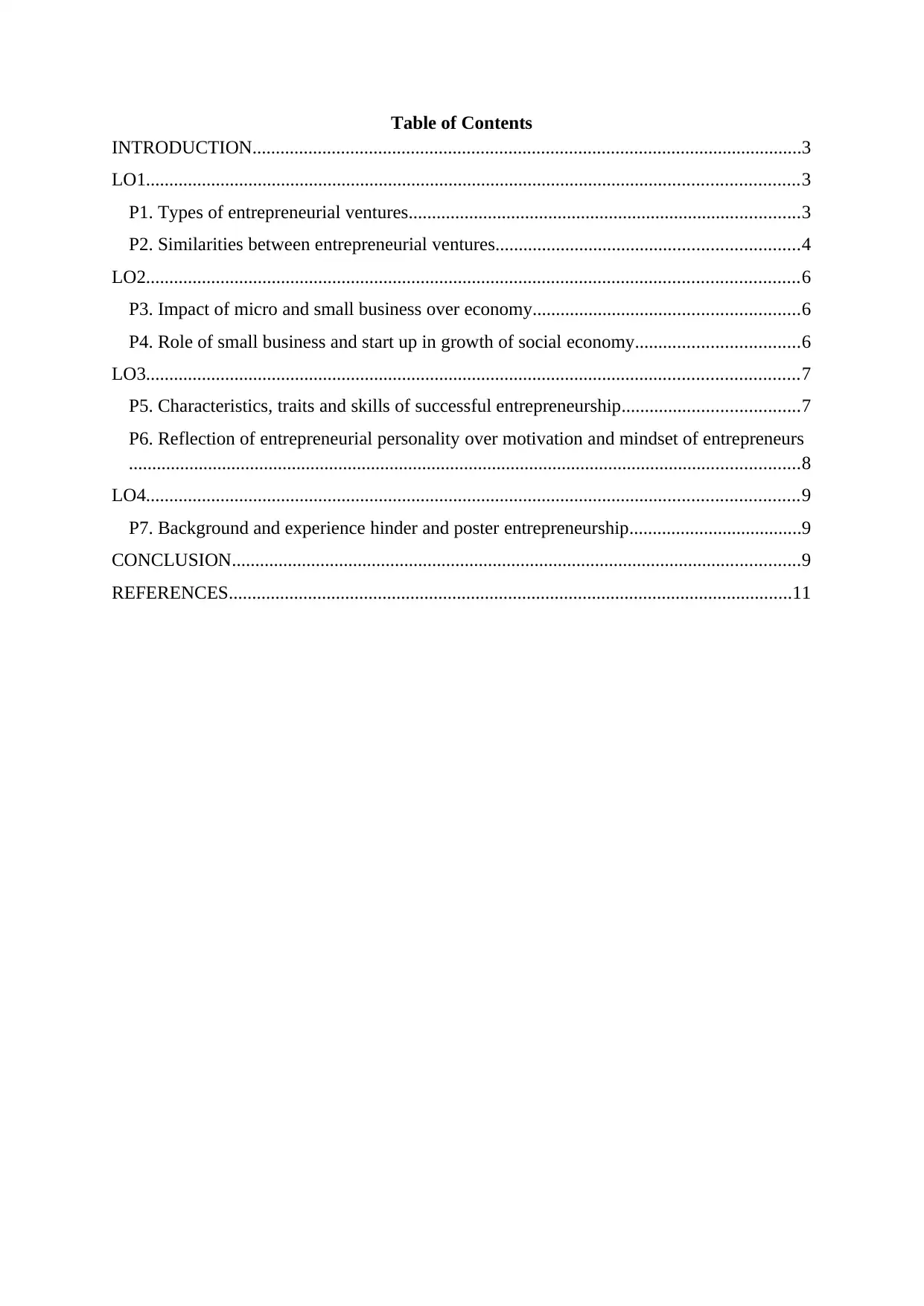
Table of Contents
INTRODUCTION......................................................................................................................3
LO1............................................................................................................................................3
P1. Types of entrepreneurial ventures....................................................................................3
P2. Similarities between entrepreneurial ventures.................................................................4
LO2............................................................................................................................................6
P3. Impact of micro and small business over economy.........................................................6
P4. Role of small business and start up in growth of social economy...................................6
LO3............................................................................................................................................7
P5. Characteristics, traits and skills of successful entrepreneurship......................................7
P6. Reflection of entrepreneurial personality over motivation and mindset of entrepreneurs
................................................................................................................................................8
LO4............................................................................................................................................9
P7. Background and experience hinder and poster entrepreneurship.....................................9
CONCLUSION..........................................................................................................................9
REFERENCES.........................................................................................................................11
INTRODUCTION......................................................................................................................3
LO1............................................................................................................................................3
P1. Types of entrepreneurial ventures....................................................................................3
P2. Similarities between entrepreneurial ventures.................................................................4
LO2............................................................................................................................................6
P3. Impact of micro and small business over economy.........................................................6
P4. Role of small business and start up in growth of social economy...................................6
LO3............................................................................................................................................7
P5. Characteristics, traits and skills of successful entrepreneurship......................................7
P6. Reflection of entrepreneurial personality over motivation and mindset of entrepreneurs
................................................................................................................................................8
LO4............................................................................................................................................9
P7. Background and experience hinder and poster entrepreneurship.....................................9
CONCLUSION..........................................................................................................................9
REFERENCES.........................................................................................................................11
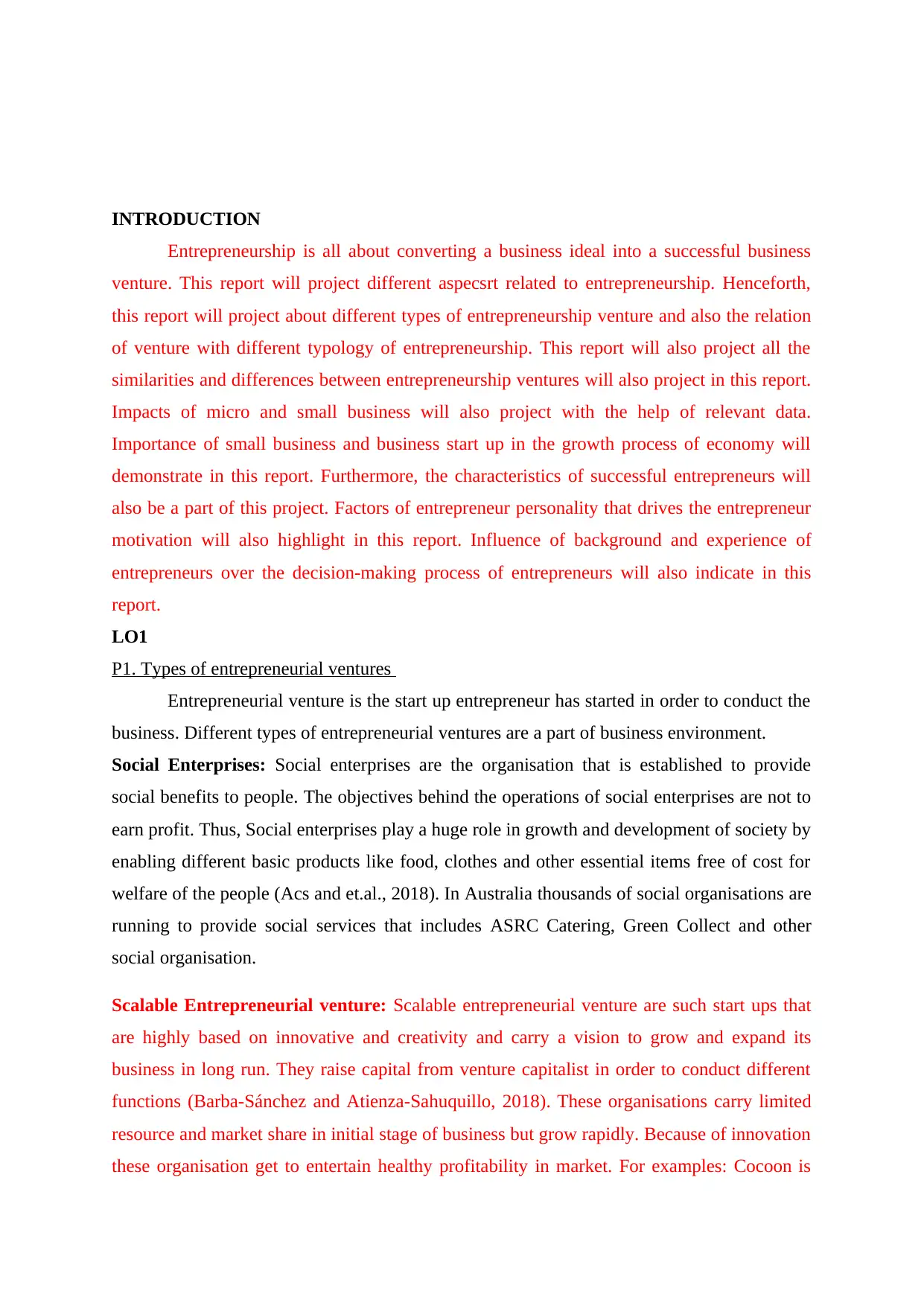
INTRODUCTION
Entrepreneurship is all about converting a business ideal into a successful business
venture. This report will project different aspecsrt related to entrepreneurship. Henceforth,
this report will project about different types of entrepreneurship venture and also the relation
of venture with different typology of entrepreneurship. This report will also project all the
similarities and differences between entrepreneurship ventures will also project in this report.
Impacts of micro and small business will also project with the help of relevant data.
Importance of small business and business start up in the growth process of economy will
demonstrate in this report. Furthermore, the characteristics of successful entrepreneurs will
also be a part of this project. Factors of entrepreneur personality that drives the entrepreneur
motivation will also highlight in this report. Influence of background and experience of
entrepreneurs over the decision-making process of entrepreneurs will also indicate in this
report.
LO1
P1. Types of entrepreneurial ventures
Entrepreneurial venture is the start up entrepreneur has started in order to conduct the
business. Different types of entrepreneurial ventures are a part of business environment.
Social Enterprises: Social enterprises are the organisation that is established to provide
social benefits to people. The objectives behind the operations of social enterprises are not to
earn profit. Thus, Social enterprises play a huge role in growth and development of society by
enabling different basic products like food, clothes and other essential items free of cost for
welfare of the people (Acs and et.al., 2018). In Australia thousands of social organisations are
running to provide social services that includes ASRC Catering, Green Collect and other
social organisation.
Scalable Entrepreneurial venture: Scalable entrepreneurial venture are such start ups that
are highly based on innovative and creativity and carry a vision to grow and expand its
business in long run. They raise capital from venture capitalist in order to conduct different
functions (Barba-Sánchez and Atienza-Sahuquillo, 2018). These organisations carry limited
resource and market share in initial stage of business but grow rapidly. Because of innovation
these organisation get to entertain healthy profitability in market. For examples: Cocoon is
Entrepreneurship is all about converting a business ideal into a successful business
venture. This report will project different aspecsrt related to entrepreneurship. Henceforth,
this report will project about different types of entrepreneurship venture and also the relation
of venture with different typology of entrepreneurship. This report will also project all the
similarities and differences between entrepreneurship ventures will also project in this report.
Impacts of micro and small business will also project with the help of relevant data.
Importance of small business and business start up in the growth process of economy will
demonstrate in this report. Furthermore, the characteristics of successful entrepreneurs will
also be a part of this project. Factors of entrepreneur personality that drives the entrepreneur
motivation will also highlight in this report. Influence of background and experience of
entrepreneurs over the decision-making process of entrepreneurs will also indicate in this
report.
LO1
P1. Types of entrepreneurial ventures
Entrepreneurial venture is the start up entrepreneur has started in order to conduct the
business. Different types of entrepreneurial ventures are a part of business environment.
Social Enterprises: Social enterprises are the organisation that is established to provide
social benefits to people. The objectives behind the operations of social enterprises are not to
earn profit. Thus, Social enterprises play a huge role in growth and development of society by
enabling different basic products like food, clothes and other essential items free of cost for
welfare of the people (Acs and et.al., 2018). In Australia thousands of social organisations are
running to provide social services that includes ASRC Catering, Green Collect and other
social organisation.
Scalable Entrepreneurial venture: Scalable entrepreneurial venture are such start ups that
are highly based on innovative and creativity and carry a vision to grow and expand its
business in long run. They raise capital from venture capitalist in order to conduct different
functions (Barba-Sánchez and Atienza-Sahuquillo, 2018). These organisations carry limited
resource and market share in initial stage of business but grow rapidly. Because of innovation
these organisation get to entertain healthy profitability in market. For examples: Cocoon is
⊘ This is a preview!⊘
Do you want full access?
Subscribe today to unlock all pages.

Trusted by 1+ million students worldwide
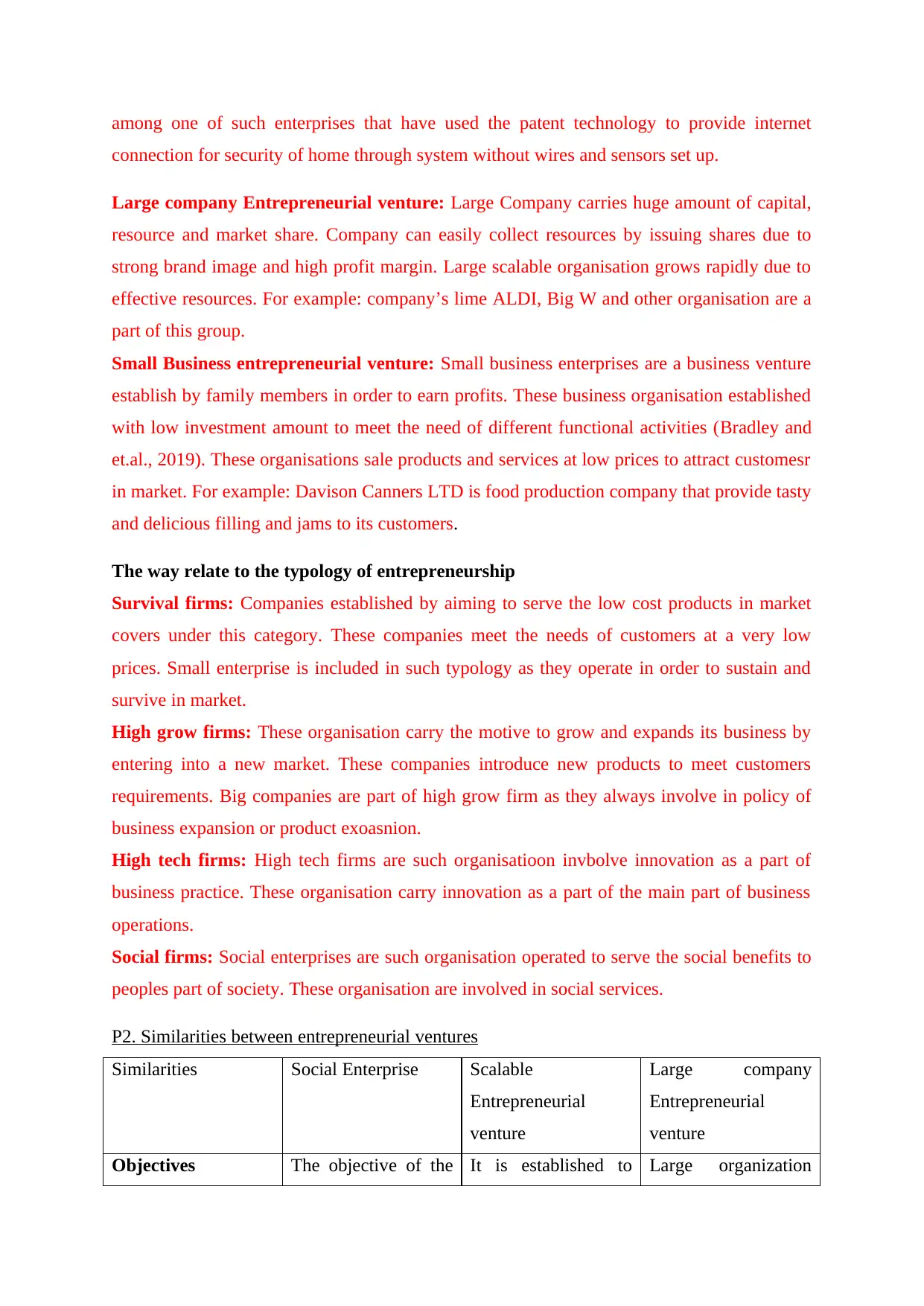
among one of such enterprises that have used the patent technology to provide internet
connection for security of home through system without wires and sensors set up.
Large company Entrepreneurial venture: Large Company carries huge amount of capital,
resource and market share. Company can easily collect resources by issuing shares due to
strong brand image and high profit margin. Large scalable organisation grows rapidly due to
effective resources. For example: company’s lime ALDI, Big W and other organisation are a
part of this group.
Small Business entrepreneurial venture: Small business enterprises are a business venture
establish by family members in order to earn profits. These business organisation established
with low investment amount to meet the need of different functional activities (Bradley and
et.al., 2019). These organisations sale products and services at low prices to attract customesr
in market. For example: Davison Canners LTD is food production company that provide tasty
and delicious filling and jams to its customers.
The way relate to the typology of entrepreneurship
Survival firms: Companies established by aiming to serve the low cost products in market
covers under this category. These companies meet the needs of customers at a very low
prices. Small enterprise is included in such typology as they operate in order to sustain and
survive in market.
High grow firms: These organisation carry the motive to grow and expands its business by
entering into a new market. These companies introduce new products to meet customers
requirements. Big companies are part of high grow firm as they always involve in policy of
business expansion or product exoasnion.
High tech firms: High tech firms are such organisatioon invbolve innovation as a part of
business practice. These organisation carry innovation as a part of the main part of business
operations.
Social firms: Social enterprises are such organisation operated to serve the social benefits to
peoples part of society. These organisation are involved in social services.
P2. Similarities between entrepreneurial ventures
Similarities Social Enterprise Scalable
Entrepreneurial
venture
Large company
Entrepreneurial
venture
Objectives The objective of the It is established to Large organization
connection for security of home through system without wires and sensors set up.
Large company Entrepreneurial venture: Large Company carries huge amount of capital,
resource and market share. Company can easily collect resources by issuing shares due to
strong brand image and high profit margin. Large scalable organisation grows rapidly due to
effective resources. For example: company’s lime ALDI, Big W and other organisation are a
part of this group.
Small Business entrepreneurial venture: Small business enterprises are a business venture
establish by family members in order to earn profits. These business organisation established
with low investment amount to meet the need of different functional activities (Bradley and
et.al., 2019). These organisations sale products and services at low prices to attract customesr
in market. For example: Davison Canners LTD is food production company that provide tasty
and delicious filling and jams to its customers.
The way relate to the typology of entrepreneurship
Survival firms: Companies established by aiming to serve the low cost products in market
covers under this category. These companies meet the needs of customers at a very low
prices. Small enterprise is included in such typology as they operate in order to sustain and
survive in market.
High grow firms: These organisation carry the motive to grow and expands its business by
entering into a new market. These companies introduce new products to meet customers
requirements. Big companies are part of high grow firm as they always involve in policy of
business expansion or product exoasnion.
High tech firms: High tech firms are such organisatioon invbolve innovation as a part of
business practice. These organisation carry innovation as a part of the main part of business
operations.
Social firms: Social enterprises are such organisation operated to serve the social benefits to
peoples part of society. These organisation are involved in social services.
P2. Similarities between entrepreneurial ventures
Similarities Social Enterprise Scalable
Entrepreneurial
venture
Large company
Entrepreneurial
venture
Objectives The objective of the It is established to Large organization
Paraphrase This Document
Need a fresh take? Get an instant paraphrase of this document with our AI Paraphraser
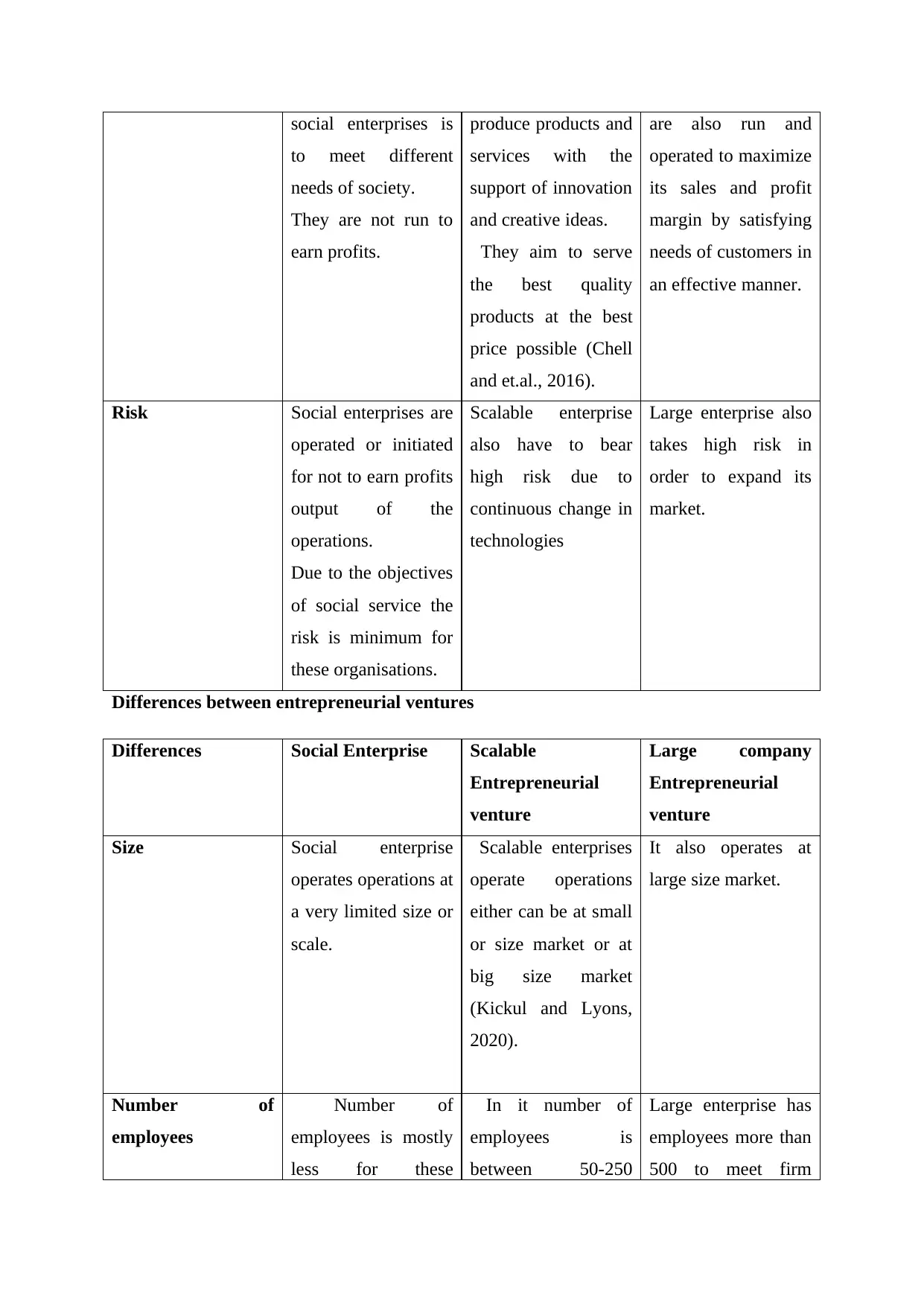
social enterprises is
to meet different
needs of society.
They are not run to
earn profits.
produce products and
services with the
support of innovation
and creative ideas.
They aim to serve
the best quality
products at the best
price possible (Chell
and et.al., 2016).
are also run and
operated to maximize
its sales and profit
margin by satisfying
needs of customers in
an effective manner.
Risk Social enterprises are
operated or initiated
for not to earn profits
output of the
operations.
Due to the objectives
of social service the
risk is minimum for
these organisations.
Scalable enterprise
also have to bear
high risk due to
continuous change in
technologies
Large enterprise also
takes high risk in
order to expand its
market.
Differences between entrepreneurial ventures
Differences Social Enterprise Scalable
Entrepreneurial
venture
Large company
Entrepreneurial
venture
Size Social enterprise
operates operations at
a very limited size or
scale.
Scalable enterprises
operate operations
either can be at small
or size market or at
big size market
(Kickul and Lyons,
2020).
It also operates at
large size market.
Number of
employees
Number of
employees is mostly
less for these
In it number of
employees is
between 50-250
Large enterprise has
employees more than
500 to meet firm
to meet different
needs of society.
They are not run to
earn profits.
produce products and
services with the
support of innovation
and creative ideas.
They aim to serve
the best quality
products at the best
price possible (Chell
and et.al., 2016).
are also run and
operated to maximize
its sales and profit
margin by satisfying
needs of customers in
an effective manner.
Risk Social enterprises are
operated or initiated
for not to earn profits
output of the
operations.
Due to the objectives
of social service the
risk is minimum for
these organisations.
Scalable enterprise
also have to bear
high risk due to
continuous change in
technologies
Large enterprise also
takes high risk in
order to expand its
market.
Differences between entrepreneurial ventures
Differences Social Enterprise Scalable
Entrepreneurial
venture
Large company
Entrepreneurial
venture
Size Social enterprise
operates operations at
a very limited size or
scale.
Scalable enterprises
operate operations
either can be at small
or size market or at
big size market
(Kickul and Lyons,
2020).
It also operates at
large size market.
Number of
employees
Number of
employees is mostly
less for these
In it number of
employees is
between 50-250
Large enterprise has
employees more than
500 to meet firm
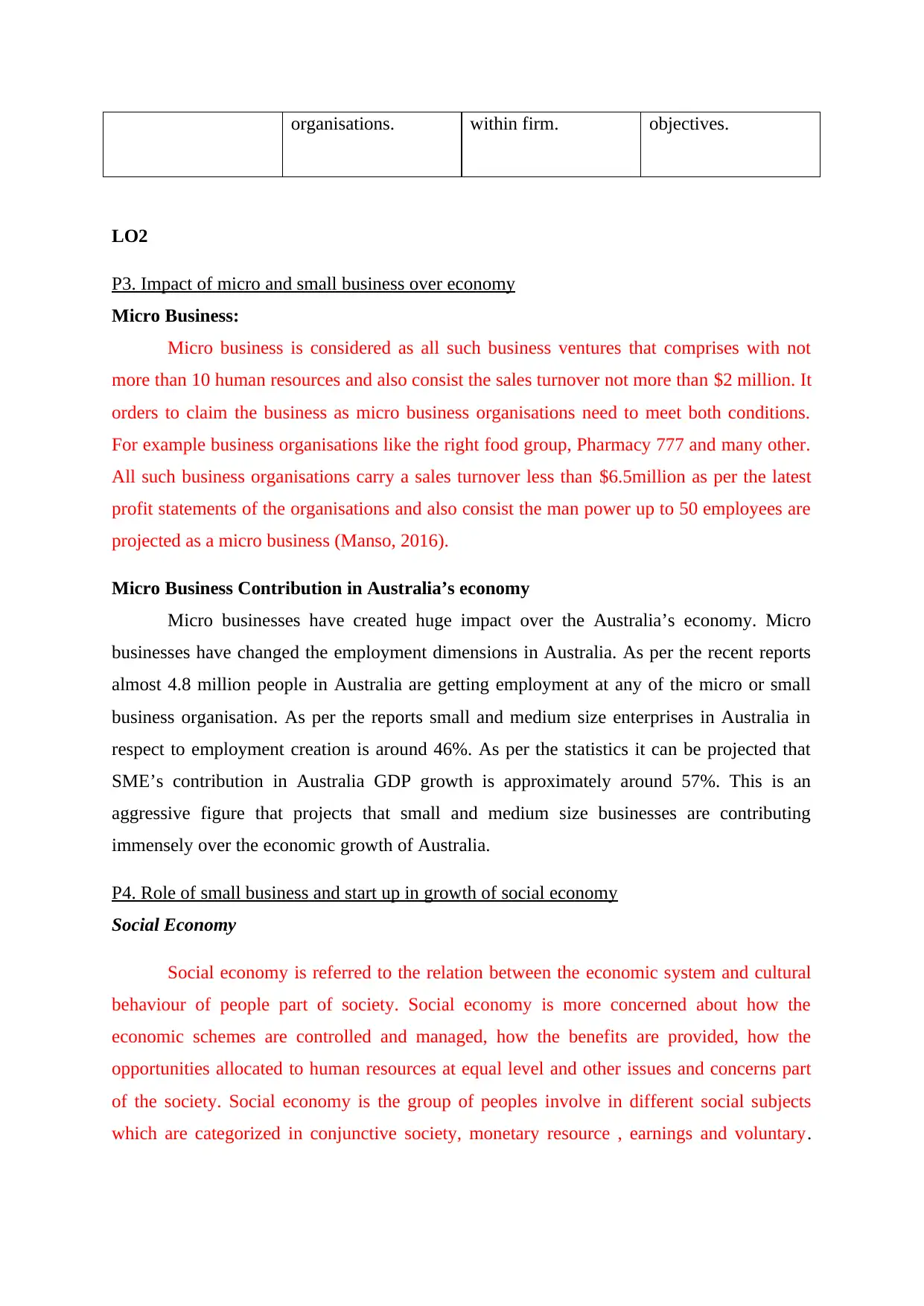
organisations. within firm. objectives.
LO2
P3. Impact of micro and small business over economy
Micro Business:
Micro business is considered as all such business ventures that comprises with not
more than 10 human resources and also consist the sales turnover not more than $2 million. It
orders to claim the business as micro business organisations need to meet both conditions.
For example business organisations like the right food group, Pharmacy 777 and many other.
All such business organisations carry a sales turnover less than $6.5million as per the latest
profit statements of the organisations and also consist the man power up to 50 employees are
projected as a micro business (Manso, 2016).
Micro Business Contribution in Australia’s economy
Micro businesses have created huge impact over the Australia’s economy. Micro
businesses have changed the employment dimensions in Australia. As per the recent reports
almost 4.8 million people in Australia are getting employment at any of the micro or small
business organisation. As per the reports small and medium size enterprises in Australia in
respect to employment creation is around 46%. As per the statistics it can be projected that
SME’s contribution in Australia GDP growth is approximately around 57%. This is an
aggressive figure that projects that small and medium size businesses are contributing
immensely over the economic growth of Australia.
P4. Role of small business and start up in growth of social economy
Social Economy
Social economy is referred to the relation between the economic system and cultural
behaviour of people part of society. Social economy is more concerned about how the
economic schemes are controlled and managed, how the benefits are provided, how the
opportunities allocated to human resources at equal level and other issues and concerns part
of the society. Social economy is the group of peoples involve in different social subjects
which are categorized in conjunctive society, monetary resource , earnings and voluntary.
LO2
P3. Impact of micro and small business over economy
Micro Business:
Micro business is considered as all such business ventures that comprises with not
more than 10 human resources and also consist the sales turnover not more than $2 million. It
orders to claim the business as micro business organisations need to meet both conditions.
For example business organisations like the right food group, Pharmacy 777 and many other.
All such business organisations carry a sales turnover less than $6.5million as per the latest
profit statements of the organisations and also consist the man power up to 50 employees are
projected as a micro business (Manso, 2016).
Micro Business Contribution in Australia’s economy
Micro businesses have created huge impact over the Australia’s economy. Micro
businesses have changed the employment dimensions in Australia. As per the recent reports
almost 4.8 million people in Australia are getting employment at any of the micro or small
business organisation. As per the reports small and medium size enterprises in Australia in
respect to employment creation is around 46%. As per the statistics it can be projected that
SME’s contribution in Australia GDP growth is approximately around 57%. This is an
aggressive figure that projects that small and medium size businesses are contributing
immensely over the economic growth of Australia.
P4. Role of small business and start up in growth of social economy
Social Economy
Social economy is referred to the relation between the economic system and cultural
behaviour of people part of society. Social economy is more concerned about how the
economic schemes are controlled and managed, how the benefits are provided, how the
opportunities allocated to human resources at equal level and other issues and concerns part
of the society. Social economy is the group of peoples involve in different social subjects
which are categorized in conjunctive society, monetary resource , earnings and voluntary.
⊘ This is a preview!⊘
Do you want full access?
Subscribe today to unlock all pages.

Trusted by 1+ million students worldwide
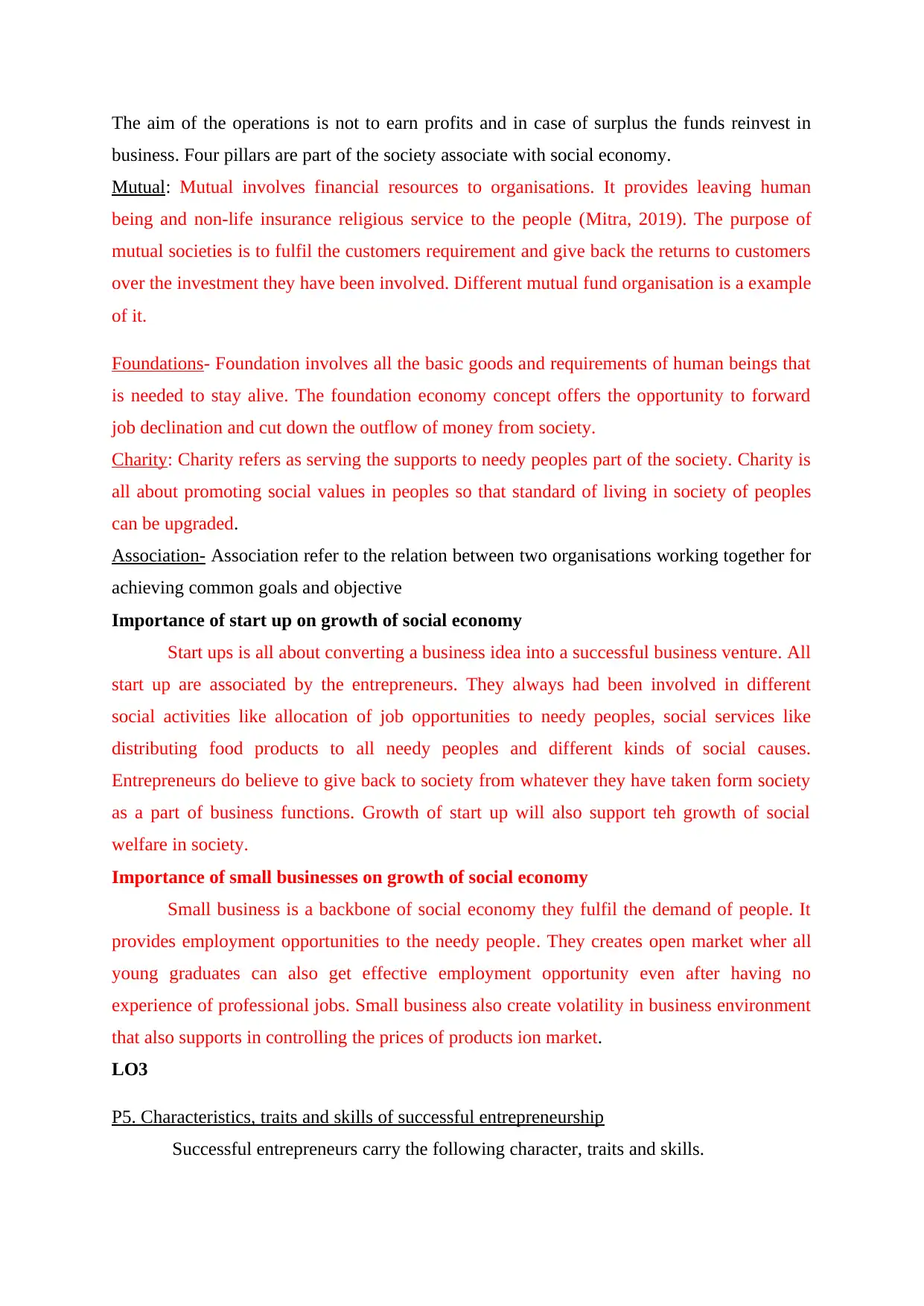
The aim of the operations is not to earn profits and in case of surplus the funds reinvest in
business. Four pillars are part of the society associate with social economy.
Mutual: Mutual involves financial resources to organisations. It provides leaving human
being and non-life insurance religious service to the people (Mitra, 2019). The purpose of
mutual societies is to fulfil the customers requirement and give back the returns to customers
over the investment they have been involved. Different mutual fund organisation is a example
of it.
Foundations- Foundation involves all the basic goods and requirements of human beings that
is needed to stay alive. The foundation economy concept offers the opportunity to forward
job declination and cut down the outflow of money from society.
Charity: Charity refers as serving the supports to needy peoples part of the society. Charity is
all about promoting social values in peoples so that standard of living in society of peoples
can be upgraded.
Association- Association refer to the relation between two organisations working together for
achieving common goals and objective
Importance of start up on growth of social economy
Start ups is all about converting a business idea into a successful business venture. All
start up are associated by the entrepreneurs. They always had been involved in different
social activities like allocation of job opportunities to needy peoples, social services like
distributing food products to all needy peoples and different kinds of social causes.
Entrepreneurs do believe to give back to society from whatever they have taken form society
as a part of business functions. Growth of start up will also support teh growth of social
welfare in society.
Importance of small businesses on growth of social economy
Small business is a backbone of social economy they fulfil the demand of people. It
provides employment opportunities to the needy people. They creates open market wher all
young graduates can also get effective employment opportunity even after having no
experience of professional jobs. Small business also create volatility in business environment
that also supports in controlling the prices of products ion market.
LO3
P5. Characteristics, traits and skills of successful entrepreneurship
Successful entrepreneurs carry the following character, traits and skills.
business. Four pillars are part of the society associate with social economy.
Mutual: Mutual involves financial resources to organisations. It provides leaving human
being and non-life insurance religious service to the people (Mitra, 2019). The purpose of
mutual societies is to fulfil the customers requirement and give back the returns to customers
over the investment they have been involved. Different mutual fund organisation is a example
of it.
Foundations- Foundation involves all the basic goods and requirements of human beings that
is needed to stay alive. The foundation economy concept offers the opportunity to forward
job declination and cut down the outflow of money from society.
Charity: Charity refers as serving the supports to needy peoples part of the society. Charity is
all about promoting social values in peoples so that standard of living in society of peoples
can be upgraded.
Association- Association refer to the relation between two organisations working together for
achieving common goals and objective
Importance of start up on growth of social economy
Start ups is all about converting a business idea into a successful business venture. All
start up are associated by the entrepreneurs. They always had been involved in different
social activities like allocation of job opportunities to needy peoples, social services like
distributing food products to all needy peoples and different kinds of social causes.
Entrepreneurs do believe to give back to society from whatever they have taken form society
as a part of business functions. Growth of start up will also support teh growth of social
welfare in society.
Importance of small businesses on growth of social economy
Small business is a backbone of social economy they fulfil the demand of people. It
provides employment opportunities to the needy people. They creates open market wher all
young graduates can also get effective employment opportunity even after having no
experience of professional jobs. Small business also create volatility in business environment
that also supports in controlling the prices of products ion market.
LO3
P5. Characteristics, traits and skills of successful entrepreneurship
Successful entrepreneurs carry the following character, traits and skills.
Paraphrase This Document
Need a fresh take? Get an instant paraphrase of this document with our AI Paraphraser
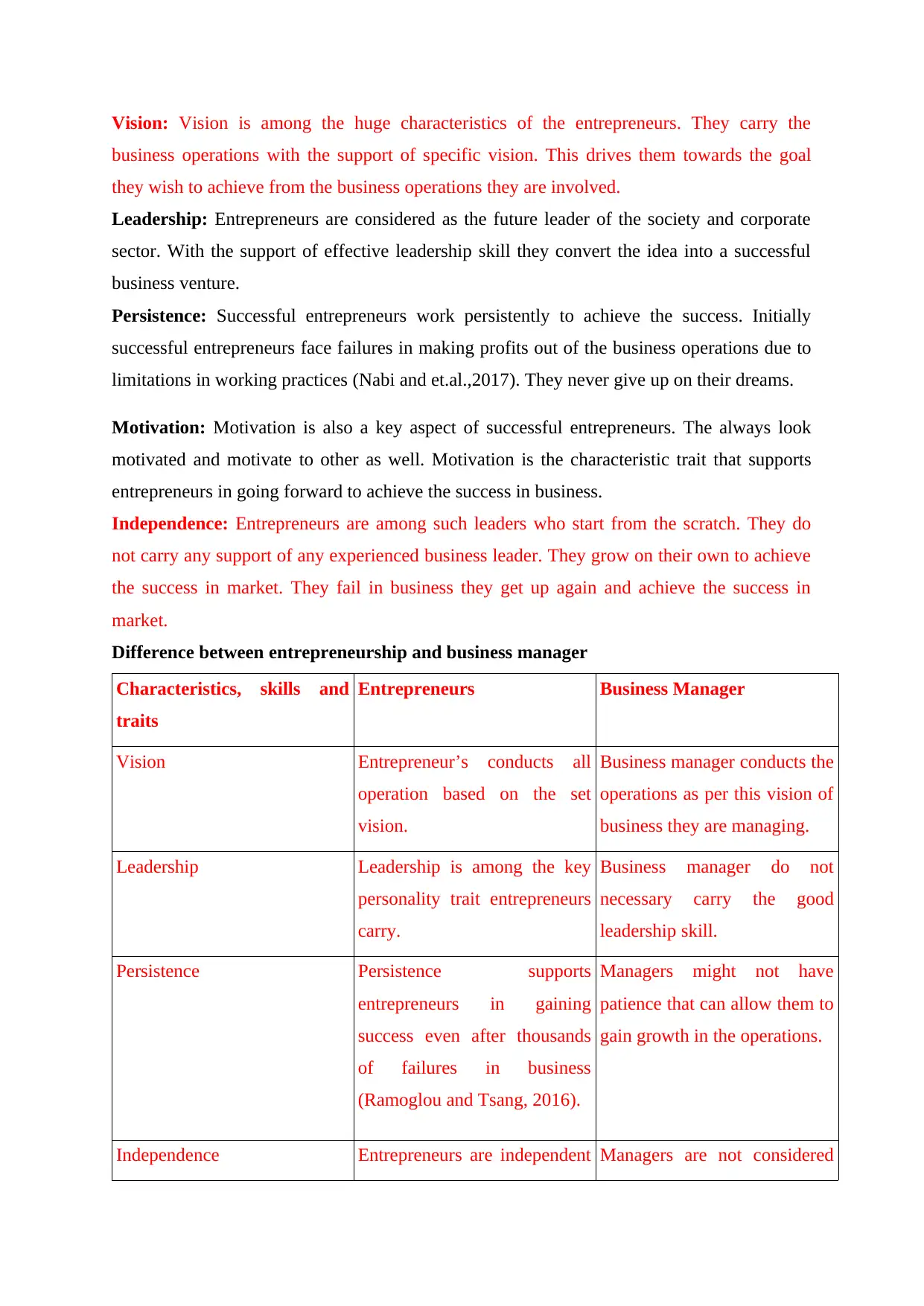
Vision: Vision is among the huge characteristics of the entrepreneurs. They carry the
business operations with the support of specific vision. This drives them towards the goal
they wish to achieve from the business operations they are involved.
Leadership: Entrepreneurs are considered as the future leader of the society and corporate
sector. With the support of effective leadership skill they convert the idea into a successful
business venture.
Persistence: Successful entrepreneurs work persistently to achieve the success. Initially
successful entrepreneurs face failures in making profits out of the business operations due to
limitations in working practices (Nabi and et.al.,2017). They never give up on their dreams.
Motivation: Motivation is also a key aspect of successful entrepreneurs. The always look
motivated and motivate to other as well. Motivation is the characteristic trait that supports
entrepreneurs in going forward to achieve the success in business.
Independence: Entrepreneurs are among such leaders who start from the scratch. They do
not carry any support of any experienced business leader. They grow on their own to achieve
the success in market. They fail in business they get up again and achieve the success in
market.
Difference between entrepreneurship and business manager
Characteristics, skills and
traits
Entrepreneurs Business Manager
Vision Entrepreneur’s conducts all
operation based on the set
vision.
Business manager conducts the
operations as per this vision of
business they are managing.
Leadership Leadership is among the key
personality trait entrepreneurs
carry.
Business manager do not
necessary carry the good
leadership skill.
Persistence Persistence supports
entrepreneurs in gaining
success even after thousands
of failures in business
(Ramoglou and Tsang, 2016).
Managers might not have
patience that can allow them to
gain growth in the operations.
Independence Entrepreneurs are independent Managers are not considered
business operations with the support of specific vision. This drives them towards the goal
they wish to achieve from the business operations they are involved.
Leadership: Entrepreneurs are considered as the future leader of the society and corporate
sector. With the support of effective leadership skill they convert the idea into a successful
business venture.
Persistence: Successful entrepreneurs work persistently to achieve the success. Initially
successful entrepreneurs face failures in making profits out of the business operations due to
limitations in working practices (Nabi and et.al.,2017). They never give up on their dreams.
Motivation: Motivation is also a key aspect of successful entrepreneurs. The always look
motivated and motivate to other as well. Motivation is the characteristic trait that supports
entrepreneurs in going forward to achieve the success in business.
Independence: Entrepreneurs are among such leaders who start from the scratch. They do
not carry any support of any experienced business leader. They grow on their own to achieve
the success in market. They fail in business they get up again and achieve the success in
market.
Difference between entrepreneurship and business manager
Characteristics, skills and
traits
Entrepreneurs Business Manager
Vision Entrepreneur’s conducts all
operation based on the set
vision.
Business manager conducts the
operations as per this vision of
business they are managing.
Leadership Leadership is among the key
personality trait entrepreneurs
carry.
Business manager do not
necessary carry the good
leadership skill.
Persistence Persistence supports
entrepreneurs in gaining
success even after thousands
of failures in business
(Ramoglou and Tsang, 2016).
Managers might not have
patience that can allow them to
gain growth in the operations.
Independence Entrepreneurs are independent Managers are not considered
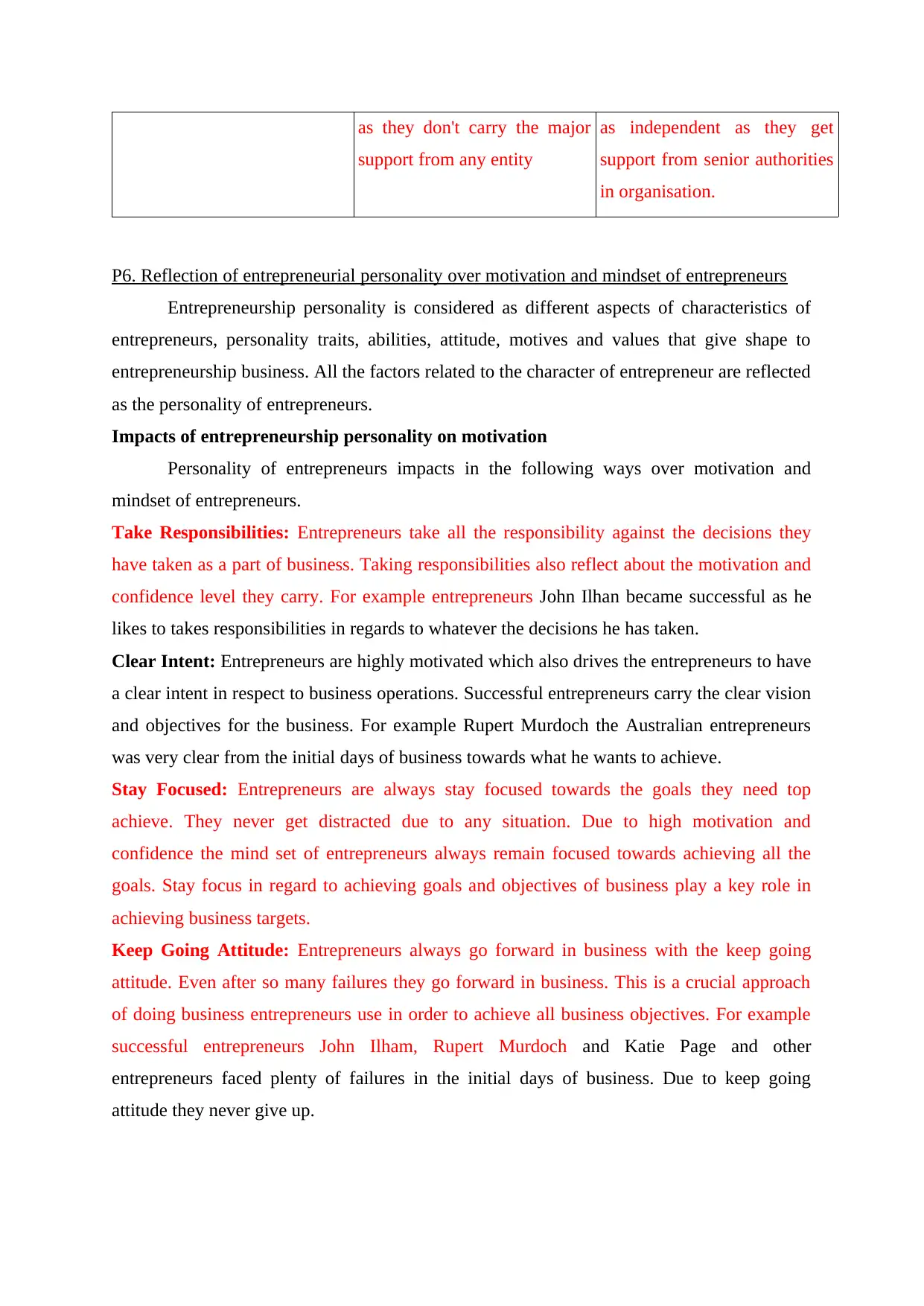
as they don't carry the major
support from any entity
as independent as they get
support from senior authorities
in organisation.
P6. Reflection of entrepreneurial personality over motivation and mindset of entrepreneurs
Entrepreneurship personality is considered as different aspects of characteristics of
entrepreneurs, personality traits, abilities, attitude, motives and values that give shape to
entrepreneurship business. All the factors related to the character of entrepreneur are reflected
as the personality of entrepreneurs.
Impacts of entrepreneurship personality on motivation
Personality of entrepreneurs impacts in the following ways over motivation and
mindset of entrepreneurs.
Take Responsibilities: Entrepreneurs take all the responsibility against the decisions they
have taken as a part of business. Taking responsibilities also reflect about the motivation and
confidence level they carry. For example entrepreneurs John Ilhan became successful as he
likes to takes responsibilities in regards to whatever the decisions he has taken.
Clear Intent: Entrepreneurs are highly motivated which also drives the entrepreneurs to have
a clear intent in respect to business operations. Successful entrepreneurs carry the clear vision
and objectives for the business. For example Rupert Murdoch the Australian entrepreneurs
was very clear from the initial days of business towards what he wants to achieve.
Stay Focused: Entrepreneurs are always stay focused towards the goals they need top
achieve. They never get distracted due to any situation. Due to high motivation and
confidence the mind set of entrepreneurs always remain focused towards achieving all the
goals. Stay focus in regard to achieving goals and objectives of business play a key role in
achieving business targets.
Keep Going Attitude: Entrepreneurs always go forward in business with the keep going
attitude. Even after so many failures they go forward in business. This is a crucial approach
of doing business entrepreneurs use in order to achieve all business objectives. For example
successful entrepreneurs John Ilham, Rupert Murdoch and Katie Page and other
entrepreneurs faced plenty of failures in the initial days of business. Due to keep going
attitude they never give up.
support from any entity
as independent as they get
support from senior authorities
in organisation.
P6. Reflection of entrepreneurial personality over motivation and mindset of entrepreneurs
Entrepreneurship personality is considered as different aspects of characteristics of
entrepreneurs, personality traits, abilities, attitude, motives and values that give shape to
entrepreneurship business. All the factors related to the character of entrepreneur are reflected
as the personality of entrepreneurs.
Impacts of entrepreneurship personality on motivation
Personality of entrepreneurs impacts in the following ways over motivation and
mindset of entrepreneurs.
Take Responsibilities: Entrepreneurs take all the responsibility against the decisions they
have taken as a part of business. Taking responsibilities also reflect about the motivation and
confidence level they carry. For example entrepreneurs John Ilhan became successful as he
likes to takes responsibilities in regards to whatever the decisions he has taken.
Clear Intent: Entrepreneurs are highly motivated which also drives the entrepreneurs to have
a clear intent in respect to business operations. Successful entrepreneurs carry the clear vision
and objectives for the business. For example Rupert Murdoch the Australian entrepreneurs
was very clear from the initial days of business towards what he wants to achieve.
Stay Focused: Entrepreneurs are always stay focused towards the goals they need top
achieve. They never get distracted due to any situation. Due to high motivation and
confidence the mind set of entrepreneurs always remain focused towards achieving all the
goals. Stay focus in regard to achieving goals and objectives of business play a key role in
achieving business targets.
Keep Going Attitude: Entrepreneurs always go forward in business with the keep going
attitude. Even after so many failures they go forward in business. This is a crucial approach
of doing business entrepreneurs use in order to achieve all business objectives. For example
successful entrepreneurs John Ilham, Rupert Murdoch and Katie Page and other
entrepreneurs faced plenty of failures in the initial days of business. Due to keep going
attitude they never give up.
⊘ This is a preview!⊘
Do you want full access?
Subscribe today to unlock all pages.

Trusted by 1+ million students worldwide

LO4
P7. Background and experience hinder and poster entrepreneurship
Covered in PPT.
CONCLUSION
This report has concluded about different aspects related to entrepreneurs. Successful
entrepreneurs carry effective leadership skill, research skill, decision making ability and so
many qualities and personality trait which allows them to get success in the business.
Entrepreneurship is all about converting an idea into a successful business venture. In order
top gain te success entrepreneurs fail so many times. Keep going attitude of entrepreneurs
allow them to achieve the success even after considering failures in business. They always
carry a clear intent, stay focused, never give up attitude which supports them throughout the
journey of getting success as an entrepreneur.
P7. Background and experience hinder and poster entrepreneurship
Covered in PPT.
CONCLUSION
This report has concluded about different aspects related to entrepreneurs. Successful
entrepreneurs carry effective leadership skill, research skill, decision making ability and so
many qualities and personality trait which allows them to get success in the business.
Entrepreneurship is all about converting an idea into a successful business venture. In order
top gain te success entrepreneurs fail so many times. Keep going attitude of entrepreneurs
allow them to achieve the success even after considering failures in business. They always
carry a clear intent, stay focused, never give up attitude which supports them throughout the
journey of getting success as an entrepreneur.
Paraphrase This Document
Need a fresh take? Get an instant paraphrase of this document with our AI Paraphraser
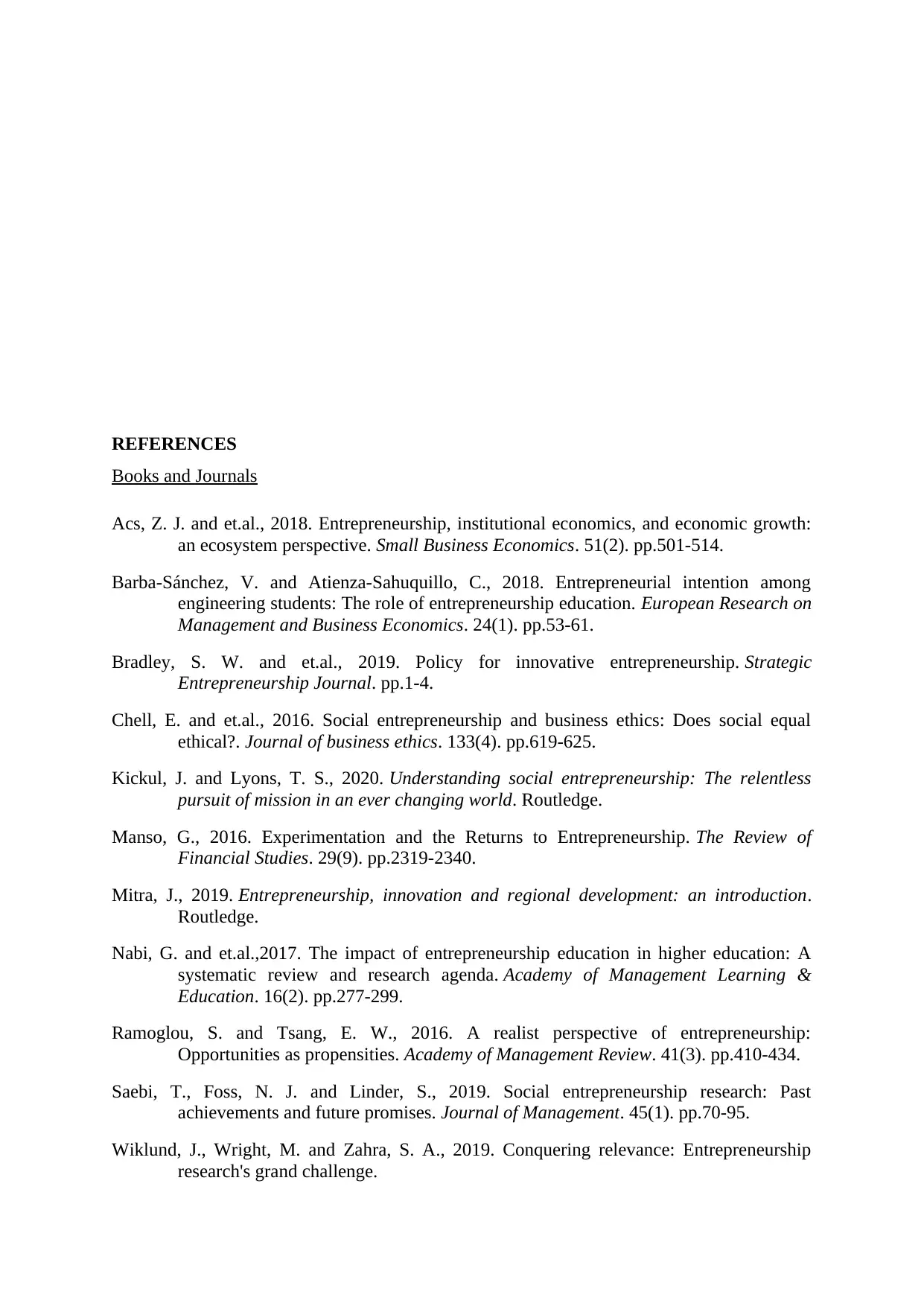
REFERENCES
Books and Journals
Acs, Z. J. and et.al., 2018. Entrepreneurship, institutional economics, and economic growth:
an ecosystem perspective. Small Business Economics. 51(2). pp.501-514.
Barba-Sánchez, V. and Atienza-Sahuquillo, C., 2018. Entrepreneurial intention among
engineering students: The role of entrepreneurship education. European Research on
Management and Business Economics. 24(1). pp.53-61.
Bradley, S. W. and et.al., 2019. Policy for innovative entrepreneurship. Strategic
Entrepreneurship Journal. pp.1-4.
Chell, E. and et.al., 2016. Social entrepreneurship and business ethics: Does social equal
ethical?. Journal of business ethics. 133(4). pp.619-625.
Kickul, J. and Lyons, T. S., 2020. Understanding social entrepreneurship: The relentless
pursuit of mission in an ever changing world. Routledge.
Manso, G., 2016. Experimentation and the Returns to Entrepreneurship. The Review of
Financial Studies. 29(9). pp.2319-2340.
Mitra, J., 2019. Entrepreneurship, innovation and regional development: an introduction.
Routledge.
Nabi, G. and et.al.,2017. The impact of entrepreneurship education in higher education: A
systematic review and research agenda. Academy of Management Learning &
Education. 16(2). pp.277-299.
Ramoglou, S. and Tsang, E. W., 2016. A realist perspective of entrepreneurship:
Opportunities as propensities. Academy of Management Review. 41(3). pp.410-434.
Saebi, T., Foss, N. J. and Linder, S., 2019. Social entrepreneurship research: Past
achievements and future promises. Journal of Management. 45(1). pp.70-95.
Wiklund, J., Wright, M. and Zahra, S. A., 2019. Conquering relevance: Entrepreneurship
research's grand challenge.
Books and Journals
Acs, Z. J. and et.al., 2018. Entrepreneurship, institutional economics, and economic growth:
an ecosystem perspective. Small Business Economics. 51(2). pp.501-514.
Barba-Sánchez, V. and Atienza-Sahuquillo, C., 2018. Entrepreneurial intention among
engineering students: The role of entrepreneurship education. European Research on
Management and Business Economics. 24(1). pp.53-61.
Bradley, S. W. and et.al., 2019. Policy for innovative entrepreneurship. Strategic
Entrepreneurship Journal. pp.1-4.
Chell, E. and et.al., 2016. Social entrepreneurship and business ethics: Does social equal
ethical?. Journal of business ethics. 133(4). pp.619-625.
Kickul, J. and Lyons, T. S., 2020. Understanding social entrepreneurship: The relentless
pursuit of mission in an ever changing world. Routledge.
Manso, G., 2016. Experimentation and the Returns to Entrepreneurship. The Review of
Financial Studies. 29(9). pp.2319-2340.
Mitra, J., 2019. Entrepreneurship, innovation and regional development: an introduction.
Routledge.
Nabi, G. and et.al.,2017. The impact of entrepreneurship education in higher education: A
systematic review and research agenda. Academy of Management Learning &
Education. 16(2). pp.277-299.
Ramoglou, S. and Tsang, E. W., 2016. A realist perspective of entrepreneurship:
Opportunities as propensities. Academy of Management Review. 41(3). pp.410-434.
Saebi, T., Foss, N. J. and Linder, S., 2019. Social entrepreneurship research: Past
achievements and future promises. Journal of Management. 45(1). pp.70-95.
Wiklund, J., Wright, M. and Zahra, S. A., 2019. Conquering relevance: Entrepreneurship
research's grand challenge.

⊘ This is a preview!⊘
Do you want full access?
Subscribe today to unlock all pages.

Trusted by 1+ million students worldwide
1 out of 12
Related Documents
Your All-in-One AI-Powered Toolkit for Academic Success.
+13062052269
info@desklib.com
Available 24*7 on WhatsApp / Email
![[object Object]](/_next/static/media/star-bottom.7253800d.svg)
Unlock your academic potential
Copyright © 2020–2025 A2Z Services. All Rights Reserved. Developed and managed by ZUCOL.





